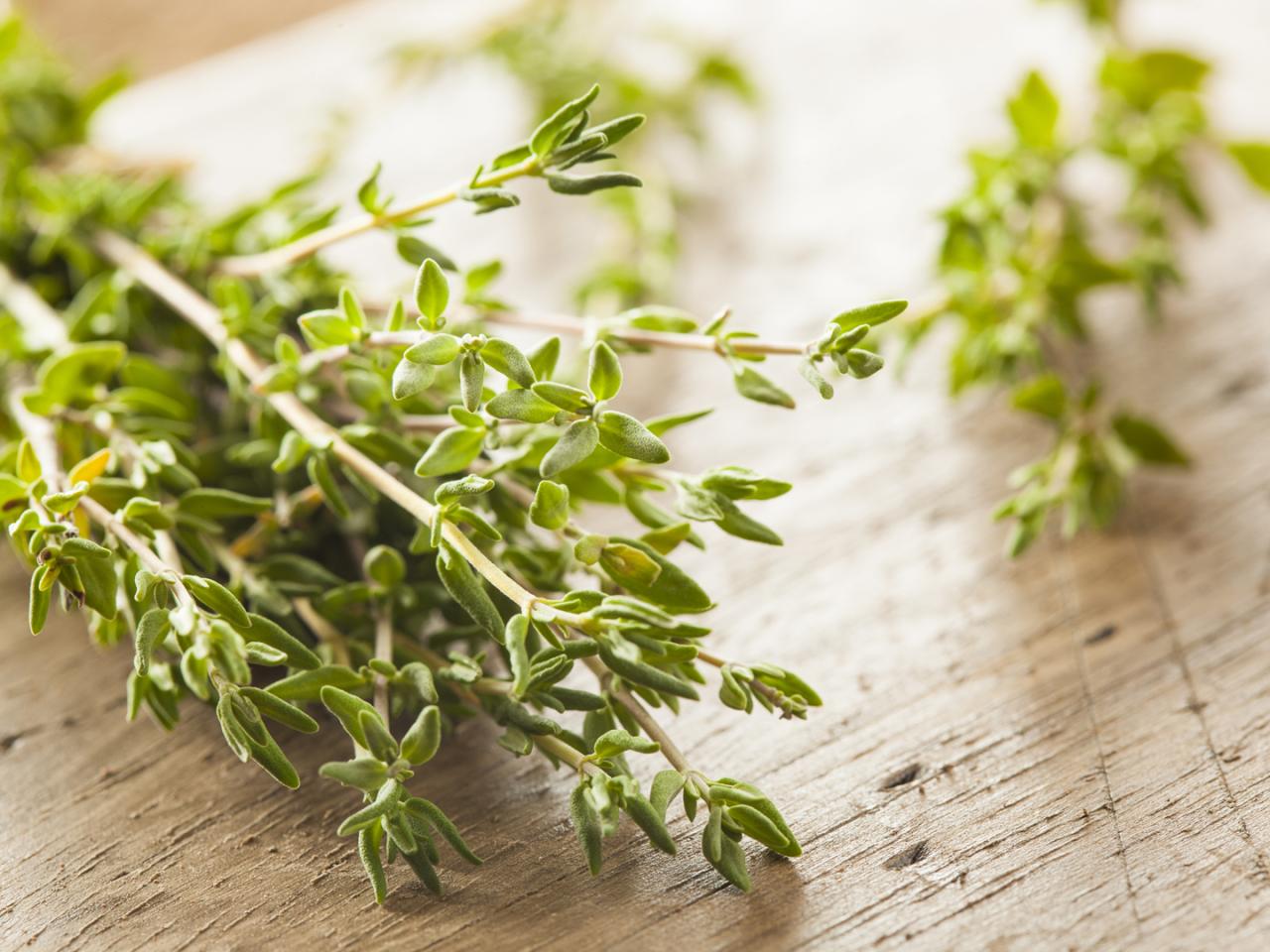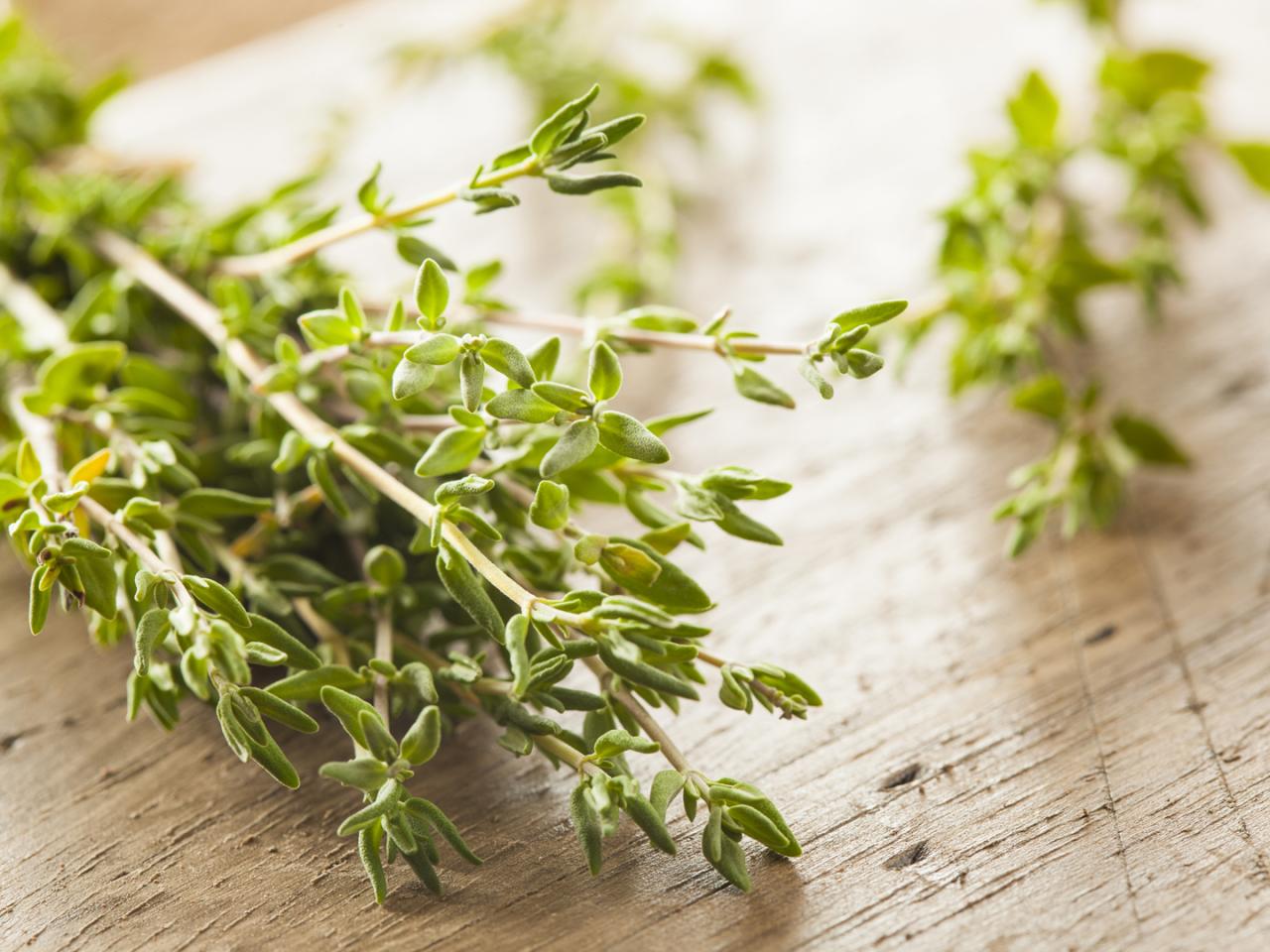The Benefits of Cooking with Thyme Piece for Your Health – The Benefits of Cooking with Thyme for Your Health go far beyond its delicious aroma and flavor. This unassuming herb, with its long history and diverse culinary uses, has been recognized for its potential health benefits for centuries. From its anti-inflammatory properties to its ability to support digestive health, thyme offers a range of advantages that can enhance your overall well-being.
Thyme, a member of the mint family, boasts a rich history dating back to ancient civilizations. Its versatility in the kitchen, its unique flavor profile, and its potential health benefits have made it a beloved ingredient across cultures. Thyme’s distinctive flavor, with its earthy, slightly pungent notes, complements a wide variety of dishes, adding depth and complexity to both savory and sweet creations.
Thyme
Thyme, a fragrant herb with a rich history and diverse culinary applications, is renowned for its distinct flavor and potential health benefits. This aromatic plant has been used for centuries in various cultures for its culinary and medicinal properties.
History and Origin of Thyme
Thyme, scientifically known as
- Thymus vulgaris*, is a member of the mint family,
- Lamiaceae*. It is believed to have originated in the Mediterranean region, where it has been cultivated for thousands of years. The name “thyme” derives from the Greek word “thymos,” meaning “courage” or “strength,” reflecting its traditional use as a symbol of bravery and resilience.
Thyme has a long history of use in ancient civilizations. The Egyptians used it in embalming rituals, while the Greeks and Romans incorporated it into their cuisine and medicine. During the Middle Ages, thyme was believed to ward off evil spirits and promote good health.
Thyme is a versatile herb known for its culinary and medicinal properties. It adds a unique flavor to dishes and is often used in traditional remedies. Just as thyme can enhance your culinary experience, propagation techniques can revitalize your African violet collection, boosting their growth and ensuring a vibrant display of blooms.
Similarly, incorporating thyme into your diet can provide a range of health benefits, including boosting immunity and promoting digestion.
Its popularity has continued throughout history, with thyme becoming a staple herb in many cuisines worldwide.
Thyme’s Flavor Profile and Culinary Uses
Thyme’s flavor is characterized by its earthy, pungent, and slightly bitter notes. It is often described as having a warm, woody, and slightly lemony aroma. Thyme’s versatility makes it a popular ingredient in various cuisines, from Mediterranean to French to American.
Thyme’s flavor complements a wide range of dishes, including:
- Meat and poultry:Thyme is a classic herb for seasoning roasted chicken, lamb, pork, and beef. It adds depth and complexity to stews, braises, and casseroles.
- Fish and seafood:Thyme can be used to enhance the flavor of grilled or baked fish, as well as seafood stews and soups.
- Vegetables:Thyme complements root vegetables, such as carrots, potatoes, and parsnips, as well as leafy greens like spinach and kale.
- Soups and stews:Thyme is a common ingredient in broths, soups, and stews, adding a savory depth and complexity to the flavor profile.
- Bread and pastries:Thyme can be incorporated into bread doughs and pastries, adding a subtle savory note and a hint of aroma.
- Marinades and sauces:Thyme is a key ingredient in many marinades and sauces, adding a distinct flavor and aroma to the dish.
Nutritional Content of Thyme
Thyme is a nutrient-rich herb, containing various vitamins, minerals, and antioxidants. A single tablespoon of dried thyme provides approximately:
- Vitamin K:Thyme is a good source of vitamin K, which is essential for blood clotting and bone health.
- Iron:Thyme contains iron, a mineral that plays a vital role in oxygen transport and energy production.
- Manganese:Thyme is a good source of manganese, a mineral that supports bone health, metabolism, and antioxidant defense.
- Fiber:Thyme provides a small amount of dietary fiber, which is beneficial for digestive health.
- Antioxidants:Thyme is rich in antioxidants, including flavonoids and phenolic acids, which help protect cells from damage caused by free radicals.
Potential Health Benefits of Thyme
- Anti-inflammatory properties:Thyme contains compounds with anti-inflammatory properties, which may help reduce inflammation in the body.
- Antimicrobial activity:Thyme has been shown to have antimicrobial activity against certain bacteria and fungi, which may help prevent infections.
- Digestive health:Thyme may help improve digestion by stimulating the production of digestive juices and reducing bloating.
- Respiratory health:Thyme is traditionally used to relieve respiratory problems, such as coughs and colds. It may help loosen phlegm and reduce inflammation in the airways.
- Immune support:Thyme may help boost the immune system by stimulating the production of white blood cells, which help fight infections.
Thyme’s Anti-Inflammatory Properties
Thyme, a culinary herb with a rich history, has been valued not only for its flavor but also for its potential health benefits. Research suggests that thyme possesses anti-inflammatory properties, which could play a role in mitigating various health conditions.
Thyme’s Anti-Inflammatory Compounds
Thyme’s anti-inflammatory effects are attributed to its active compounds, particularly thymol. Thymol, a monoterpenoid phenol, has been shown to exhibit potent anti-inflammatory activity through various mechanisms. It can inhibit the production of pro-inflammatory cytokines, such as TNF-α and IL-6, which are key players in the inflammatory cascade.
Conditions Where Thyme’s Anti-Inflammatory Properties Might Be Beneficial
Thyme’s anti-inflammatory properties have been linked to potential benefits in a range of conditions, including:
- Arthritis: Studies suggest that thyme extracts may help reduce joint pain and inflammation associated with arthritis. Thymol’s ability to suppress pro-inflammatory cytokines may contribute to its beneficial effects.
- Inflammatory Bowel Disease (IBD): Research indicates that thyme’s anti-inflammatory properties could potentially alleviate symptoms of IBD. Thymol has been shown to reduce inflammation in the gut, which could help manage IBD.
- Respiratory Infections: Thyme has been traditionally used to treat respiratory ailments like bronchitis and asthma. Its anti-inflammatory properties may help reduce inflammation in the airways, easing symptoms.
Thyme for Digestive Health: The Benefits Of Cooking With Thyme Piece For Your Health
Thyme, a culinary herb with a long history of medicinal use, has been recognized for its potential benefits for digestive health. Its aromatic compounds and active ingredients contribute to its ability to alleviate common digestive discomforts and support overall gut well-being.
The benefits of cooking with thyme extend beyond its savory aroma. This herb is packed with antioxidants, which can help protect your cells from damage. Its ability to thrive in various environments, just like the spiky seeds discussed in Why Spiky Seeds Are Critical for Biodiversity and Ecosystem Health , highlights the importance of biodiversity.
The versatility of thyme, from flavoring dishes to aiding digestion, underscores its value in our kitchens and beyond.
Thyme’s Role in Digestion
Thyme contains compounds that can aid digestion in several ways. Its volatile oils, including thymol and carvacrol, have been shown to stimulate the production of digestive juices, which are essential for breaking down food and absorbing nutrients. This enhanced digestive activity can help prevent bloating, gas, and indigestion.
Additionally, thyme’s anti-inflammatory properties can soothe the digestive tract, reducing irritation and discomfort associated with digestive issues.
Thyme and Immune Support
Thyme, a culinary herb with a rich history, is not only a flavorful addition to dishes but also possesses potential benefits for the immune system. Its antioxidant properties, in particular, have garnered attention for their role in bolstering immune defenses.
Thyme’s Antioxidant Potential for Immune Function
Antioxidants are compounds that protect cells from damage caused by free radicals, unstable molecules that can contribute to inflammation and weaken the immune system. Thyme is a rich source of antioxidants, including flavonoids and phenolic compounds, which exhibit potent anti-inflammatory and immune-boosting effects.
The antioxidants present in thyme can help neutralize free radicals, reducing oxidative stress and supporting the immune system’s ability to function effectively.
Incorporating Thyme into the Diet for Immune Support
Adding thyme to your diet is a simple and flavorful way to potentially enhance immune function. Here are some ways to incorporate this herb into your culinary routine:
- Add it to soups and stews:Thyme’s earthy flavor complements hearty soups and stews, providing a boost of antioxidants while adding depth to the dish.
- Use it in roasted vegetables:Roasting vegetables with thyme enhances their flavor and nutritional value, delivering a healthy and flavorful side dish.
- Make thyme tea:Brewing thyme tea is a convenient way to consume the herb’s beneficial compounds. Steep a teaspoon of dried thyme in hot water for 5-10 minutes, and enjoy the soothing and potentially immune-boosting beverage.
- Infuse oils and vinegars:Thyme can be infused into oils and vinegars, adding a unique flavor profile to dressings and marinades.
Thyme for Respiratory Health
Thyme has long been valued for its potential to support respiratory health. Traditional medicine has embraced thyme for centuries, utilizing its properties to address various respiratory ailments. Modern scientific research is increasingly revealing the mechanisms behind thyme’s effectiveness in easing respiratory symptoms.
Thyme’s Traditional Use for Respiratory Issues
Across cultures, thyme has been a mainstay in traditional remedies for respiratory problems. Its use in herbal medicine dates back to ancient civilizations, where it was employed to treat coughs, colds, bronchitis, and other respiratory conditions. Thyme’s reputation as a respiratory aid has been passed down through generations, solidifying its place in folk medicine.
Thyme’s Compounds and Their Respiratory Benefits
Thyme’s effectiveness in respiratory health stems from its potent chemical constituents, particularly thymol. Thymol is a natural compound with antimicrobial and expectorant properties.
Thymol’s Role in Cough and Congestion
Thymol’s antimicrobial properties help combat respiratory infections, a common cause of cough and congestion. It works by inhibiting the growth of bacteria and fungi that can trigger these symptoms.
Thymol as an Expectorant
Thymol also acts as an expectorant, aiding in the removal of mucus from the respiratory system. This property is particularly beneficial in conditions like bronchitis, where excessive mucus buildup can lead to difficulty breathing.
Using Thyme to Alleviate Respiratory Symptoms
Thyme can be incorporated into various forms to alleviate respiratory symptoms:
Thyme Tea
Steeping dried thyme leaves in hot water creates a soothing tea that can help clear congestion and soothe a cough.
Thyme Gargle
A thyme gargle can be effective in reducing throat irritation and inflammation associated with respiratory infections.
Thyme Oil
Thyme oil, diluted in a carrier oil, can be used in aromatherapy or topical applications to relieve congestion and promote relaxation.
“Inhaling thyme oil vapor can be particularly helpful in clearing congested airways.”
Thyme in Cooking

Thyme, with its aromatic and earthy flavor, is a culinary herb that has been used for centuries to enhance the taste of dishes. Its versatility makes it a staple in various cuisines worldwide, adding depth and complexity to both savory and sweet recipes.
Thyme-Infused Recipes
Thyme’s flavor profile complements a wide range of ingredients and cooking styles. Here are some examples of thyme-infused recipes:
Dish |
Cuisine |
Preparation Method |
|---|---|---|
Roast Chicken with Thyme and Lemon |
French |
Rub the chicken with thyme, lemon zest, and olive oil, then roast until golden brown. |
Tomato Soup with Thyme and Basil |
Italian |
Sauté onions and garlic with thyme, add diced tomatoes, and simmer until thickened. |
Grilled Salmon with Thyme and Garlic Butter |
Mediterranean |
Marinate salmon with thyme, garlic, and butter, then grill until flaky. |
Mushroom Risotto with Thyme and Parmesan |
Italian |
Sauté mushrooms with thyme, add Arborio rice, and cook with white wine and broth until creamy. |
Lamb Stew with Thyme and Rosemary |
British |
Brown lamb in a pot, add thyme, rosemary, vegetables, and broth, then simmer until tender. |
Thyme Flavor Pairings
Thyme’s flavor profile pairs well with a variety of ingredients, creating harmonious and delicious combinations. Here are some examples of thyme flavor pairings:
Ingredient |
Dishes |
|---|---|
Garlic |
Roasted vegetables, pasta sauces, marinades |
Lemon |
Chicken, fish, salads |
Olive Oil |
Bread dips, marinades, dressings |
Mushrooms |
Risotto, soups, stews |
Rosemary |
Lamb, poultry, vegetables |
Parmesan Cheese |
Pasta, soups, salads |
Incorporating Thyme into Everyday Meals
Thyme can be easily incorporated into everyday meals, adding flavor and complexity to your dishes. Here are some tips for incorporating thyme into your cooking:
- Add fresh thyme sprigs to soups, stews, and sauces during the last 10-15 minutes of cooking to infuse the dish with its aroma.
- Use dried thyme in rubs for poultry, fish, and vegetables, or add it to marinades for a deeper flavor.
- Sprinkle fresh thyme leaves over roasted vegetables, grilled meats, or pasta dishes for a burst of flavor.
- Make a simple thyme and garlic butter by mixing softened butter with minced garlic and chopped thyme. Use this butter to spread on bread, roast vegetables, or finish grilled meats.
Precautions and Considerations
While thyme offers numerous health benefits, it’s crucial to be aware of potential side effects and appropriate usage. Understanding these aspects ensures safe and effective utilization of thyme for its therapeutic properties.
Potential Side Effects
Thyme, like any herb, can cause adverse reactions in certain individuals.
- Allergies:Individuals with allergies to other members of the mint family, such as basil or oregano, may experience allergic reactions to thyme. Symptoms can range from mild skin irritation to more severe reactions like hives, swelling, or difficulty breathing. It’s essential to start with small amounts of thyme and monitor for any adverse reactions.
- Gastrointestinal Issues:Thyme consumption can sometimes lead to gastrointestinal upset, including nausea, vomiting, or diarrhea, especially in larger quantities. It’s advisable to consume thyme in moderation and consult a healthcare professional if you experience persistent digestive problems.
- Drug Interactions:Thyme can interact with certain medications, particularly those affecting blood clotting, such as warfarin or aspirin. Consult a healthcare professional before using thyme if you are on any medication, especially blood thinners, as it may increase the risk of bleeding.
Recommended Dosage and Safe Usage
There is no universally recommended dosage for thyme, as it depends on individual factors like age, health condition, and the specific application.
- Culinary Use:In culinary applications, thyme is generally used in small quantities, typically a teaspoon or less per dish.
- Medicinal Use:For medicinal purposes, thyme is often consumed as an infusion (tea) or taken in capsule form. The recommended dosage varies depending on the specific health concern and the product used. It’s essential to follow the directions on the product label or consult a healthcare professional for personalized guidance.
When to Consult a Healthcare Professional, The Benefits of Cooking with Thyme Piece for Your Health
While thyme is generally considered safe when used in moderation, it’s important to consult a healthcare professional in certain situations:
- Pregnancy and Breastfeeding:The safety of thyme during pregnancy and breastfeeding is not fully established. It’s best to avoid using thyme during these periods unless advised by a healthcare professional.
- Existing Medical Conditions:Individuals with pre-existing medical conditions, such as bleeding disorders, should consult a healthcare professional before using thyme.
- Adverse Reactions:If you experience any adverse reactions after consuming thyme, discontinue use and seek medical advice.
Final Summary

Incorporating thyme into your culinary repertoire offers a delicious and potentially beneficial way to enhance your health and well-being. Whether you’re seeking to reduce inflammation, support digestion, or boost your immune system, thyme’s versatility and nutritional value make it a valuable addition to your diet.
So, explore the world of thyme-infused recipes, discover its unique flavor pairings, and experience the numerous benefits this humble herb has to offer.
FAQ Section
Is thyme safe for everyone to consume?
While thyme is generally safe for consumption, it’s important to be aware of potential side effects, such as allergies and drug interactions. It’s always advisable to consult a healthcare professional if you have any concerns or are taking medications.
How much thyme should I consume daily?
There is no specific recommended daily intake for thyme. However, it’s generally considered safe to consume moderate amounts in food. As with any herb or spice, it’s best to start with small amounts and gradually increase as needed.
Can I use thyme fresh or dried?
Both fresh and dried thyme are commonly used in cooking. Fresh thyme offers a more intense flavor, while dried thyme is more concentrated. Generally, use about three times the amount of dried thyme compared to fresh thyme.
